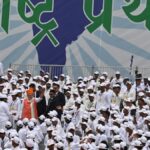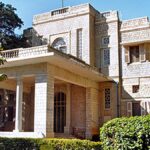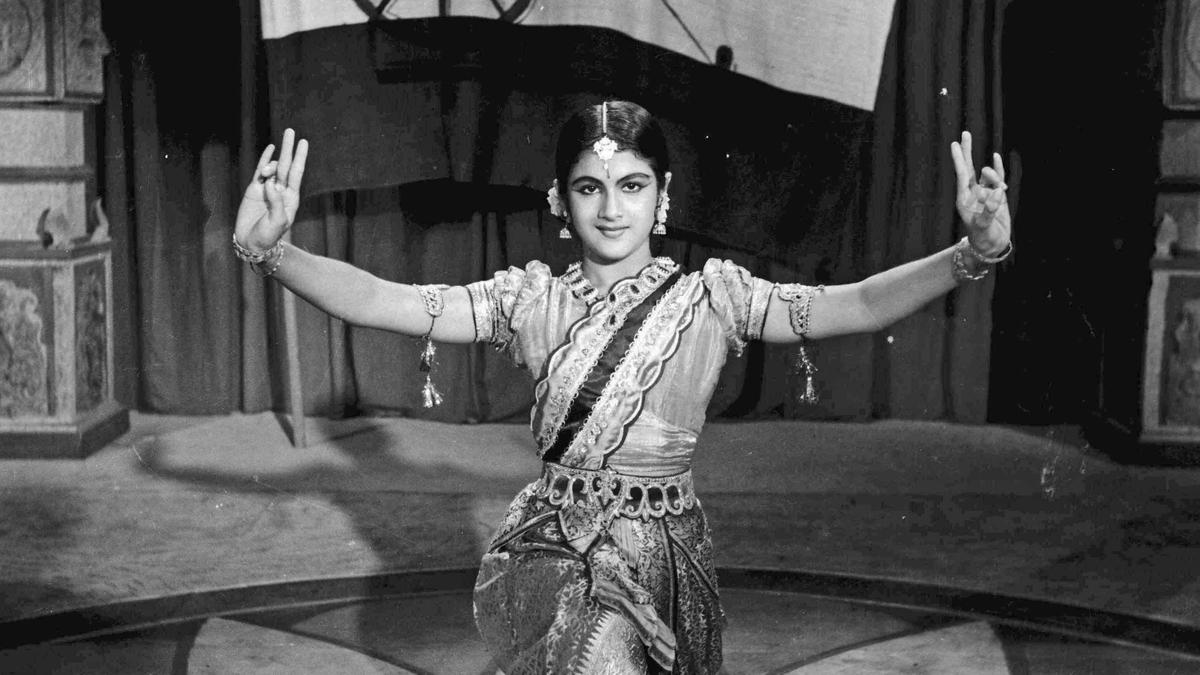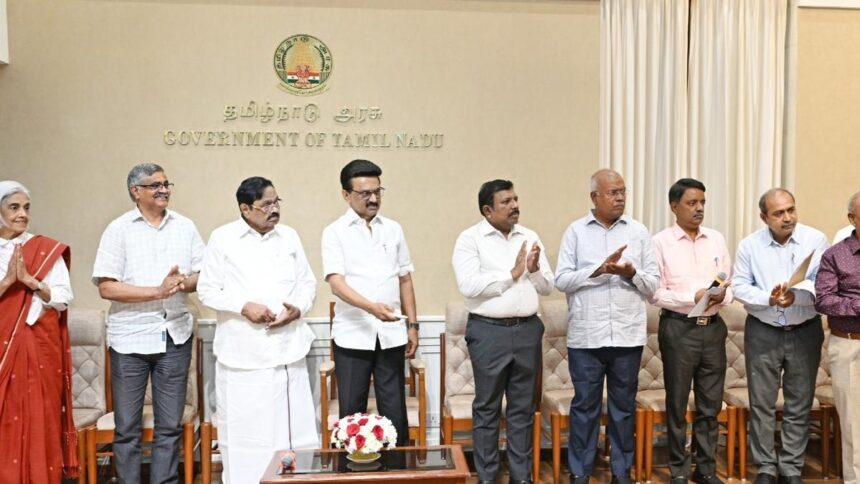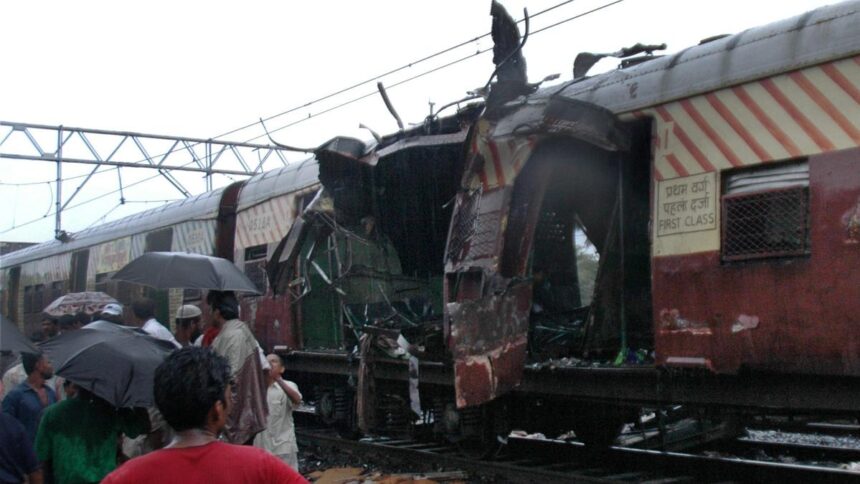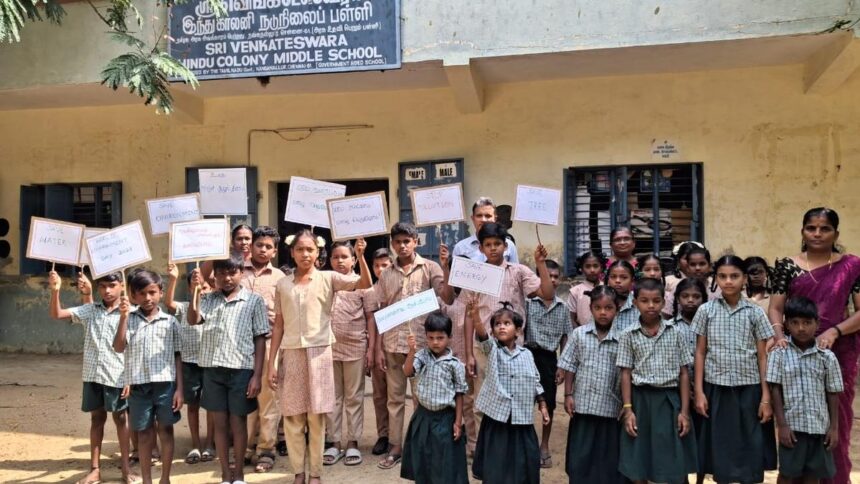An incident recalled by theatre personality and film actor Avvai T.K. Shanmugam in his memoir Enathu Nataka Vazhkai (My Drama Life) explains the popularity of the patriotic songs of ‘Madhurakavi’ Bhaskara Das, a freedom fighter and the first Tamil lyricist, who was arrested 26 times by the British government. “He had penned a lot of songs in praise of freedom fighters. I have even heard children begging on the streets singing his songs,” writes Shanmugam, the first to introduce national poet Subramaniya Bharathiyar’s songs in plays. Shanmugam, a loyalist of the Congress and wearer of khadi, produced 157 plays for Congress committees in various parts of the State of Madras.
Tamil cinema, an extension of Tamil theatre, soon took a plunge into the freedom movement after the advent of talkies. Despite the watchful eyes of the British government, theatre personalities and film-makers introduced nationalist ideas and songs — particularly those of Bharathiyar — into their plays and films.
A play banned by the British
Bharathiyar’s songs were first included in the play Desa Bhakti, which was banned by the British government. The drama also incorporated Gandhi Mahan Kathai, rendered as Villupattu, which was popularised by comedian N.S. Krishnan.
“When the artistes from the stage moved to film studios in the 1930s, they brought with them their ideology, their involvement with the political activism of the Congress, propaganda methods, and, of course, the corpus of songs,” writes film historian Theodore Baskaran in his book, History through the Lens.
Desa Bhakti was based on the play Panapurathu Veeran by writer V. Saminatha Sharma. Since the original play was banned, it was performed under the title Desa Bhakti. Bhaskara Das, a Madurai-based playwright, introduced the play to Shanmugam and his brothers, adding some new elements.
Explaining how the “politicisation of Tamil cinema gradually intensified”, Mr. Theodore Baskaran says that even in the first Tamil talkie, Kalidas (1931), there was a song praising Gandhian ideals and the chakra, although it was a mythological film. All the songs in the film were penned by Bhaskara Das, and the song Indiarkal Nammavarkalukul Eno Veen Chandai (Why do Indians have unnecessary fights among ourselves?) advocated amity between Hindus and Muslims. “Typical of this genre was Iru Sagotharargal (The Two Brothers, 1936), which, too, had been a popular play,” writes Mr. Theodore Baskaran.
The entry of theatre personalities, who were ardent supporters of the freedom movement, into the film world ensured the continuation of their spirit and ideals in cinema. K.S. Santhanakrishna Naidu of the Arya Gana Sabha, who produced plays aimed at inculcating patriotism in the masses; M.S. Balasundaram, who wrote an elegy for Motilal Nehru; Bhaskara Das, whose song Raatinamaam Gandhi Kai Paanamam echoed across Tamil Nadu; and Boomi Baladoss, who wrote lyrics for films, were among the contributors, says Aranathi Narayanan in his book Tamil Cinemavin Kathai.
Many others also acted in films. Among them were M.G. Nataraja Pillai who was arrested for his participation in the Civil Disobedience Movement; S.V. Subbaiah Bhagavatar, arrested for picketing toddy shops; Sundaramurthy Oduvar, who actively participated in the movement against untouchability; and S. Devudu Iyer, arrested for singing songs against the British during the Salt Satyagraha.
Though censorship remained a challenge for films carrying messages of the freedom movement, the Government of India Act, 1935, and the 1937 election, in which C. Rajagopalachari was elected the Prime Minister of the Madras Presidency (as the post of Chief Minister was known then), almost brought film censorship to an end.
‘Newfound freedom’
“Utilising the newfound freedom, overtly propagandist films supporting nationalistic struggles were made. One such film was Mathrubhoomi (Motherland, 1939), an allegory set against the background of Alexander’s invasion of India,” says Mr. Theodore Baskaran.
He says K.B. Sundarambal, a star of the stage and the screen, campaigned for the Congress. “Gramophone discs of propaganda songs by luminaries of the screen, including K.B. Sundarambal, were released. All these artistes had acquired fame and popularity as film personalities, and they used their charisma in the cause of nationalism,” he writes.
Another film that kindled the spirit of nationalism was Thyagabhoomi, an adaptation of writer Kalki’s novel serialised in Ananda Vikatan. The film was made by taking advantage of the Congress’s victory under Rajaji in the 1937 election. Directed by K. Subramanyam, it featured S.D. Subbulakshmi and K.J. Mahadevan in the lead roles. It advocated progressive ideas of marital relationships. The film’s storyline dealt with the tensions between a couple. Instead of living a life of fear, the wife becomes a freedom fighter, singing Desa Sevai Seyya Vaareer, popularised by Carnatic vocalist D.K. Pattammal. According to a report in The Hindu, the film was banned by the British government when it assumed power from the Congress, which resigned over the issue of the Second World War.
“The British Indian rulers thought Thyagabhoomi was Congress propaganda. The film features a procession of Gandhi-capped volunteers. Off-screen, D.K. Pattammal sings Desa Sevai Seyya Vaareer,” writes film historian Randor Guy. However, director K. Subramanyam and Kalki screened the film for free at Gaiety Cinema, Madras, until the ban order was officially served on the theatre owners. One person died in the baton-charge at the theatre.
As the country inched closer to independence, film producers began including patriotic songs. Naam Iruvar, produced by AVM, which had the rights to Bharathiyar’s songs, featured Aaduvome Pallu Paaduvome. It celebrated independence even before it was achieved and was screened in cinemas on the day the country made its tryst with destiny. Meiyappa Chettiar, owner of AVM Studios, recorded the song Thayin Manikodi Pareer and included it in the film. “After independence, the film actors as a community, who had earlier been backing the cause of the Congress, moved on to support the Dravidian Movement,” writes Mr. Theodore Baskaran.
Published – August 15, 2025 09:00 am IST





